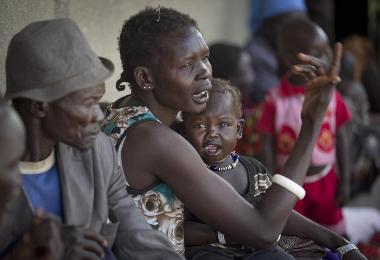South Sudan conflict: “fleeing for the second time”
January 13, 2013 (JUBA) – Ateny Pandiar fled Bor twenty years ago during the civil war and became a refugee with her daughter. Now in her sixties she has been forced to flee for a second time with grandson.

Gadet is fighting alongside South Sudan’s former vice-president Riek Machar who is leading a rebellion against the government since 15 December 2013.
The UN estimates that 352,000 people have been displaced within South Sudan as well as close to 43,000 refugees fleeing to neighbouring countries. Uganda is receiving between 3,000-4,000 refugees a day.
Around 84,000 mostly from Bor have fled to Mingkaman and surrounding areas in Awerial county in Lakes State. Only around half of those displaced have been reached with aid, according to the UN.
Fleeing with her daughter’s son, Ateny is waiting to be registered as an internally displaced person (IDP) in Nimule, in Eastern Equatoria state. She, like other women who fled and left their sons or husbands behind in Bor, want to stay in South Sudan.
“We are tired of being refugees,” said Ateny.
Registration has stalled for IDPs in Nimule but local officials say assessment is nearly complete.
“We are conducting interviews with these IDPs to ascertain their populations and needs,” said Gilbert Ashushe, the coordinator for non-government organisations in Nimule.
As Ateny and the five other children she taking care of are waiting for possible resettlement in Nimule, she is concerned they will not have enough to eat.
“We ran without food and we have been living on handouts,” said Elizabeth Diing, a mother of six children.
“When we were escaping the enemy, you just ran with what you grabbed. Some people who missed to catch their children’s hands left them to die there (in Bor),” she said.
Bor has changed hands between rebels and government soldiers three times– falling to government troops on December 25 only to be recaptured by rebels on December 30. Bor is the only town that remains at rebels’ hands after losing, Bentiu, the capital of oil-producing Unity state to government forces last week.
The current conflict in South Sudan began in the barracks of the Presidential Guard between soldiers loyal to President Salva Kiir, a Dinka, and Riek Machar, a Nuer, who Kiir accuses of attempting to stage a coup on December 15.
Machar and those allied to him, who hail from a number of South Sudan’s many tribes, deny attempting to topple Kiir. However, the former Vice President who was sacked in July is now heading a rebellion composed of army defectors and armed Nuer civilians – dubbed “white army”.
The army says it will soon regain control of Bor, whose civilians were placed in a similar predicament the last time there was a major military split within the SPLA in 1991 during the civil war, when Machar last broke away the rebel movement.
The civil war between the SPLA and the Khartoum government came to an end 2005 when the South was granted the right to secede from the rest of Sudan in 2011. Before the deal Machar rejoined the SPLM and was appointed as Vice President position from which he was sacked in July last year.
President Kiir and his deputy Riek Machar fell out over issues of governance, human rights and democracy in the ruling SPLM party. Machar publicly declared his intention to unseat Kiir as the SPLM chairman to pave way to be the SPLM’s candidate in the 2015 presidential elections.
President Kiir responded by sacking Machar during a cabinet reshuffle in July last year. A number of former cabinet ministers, who were relieved of their positions at the same time have been detained for nearly a month accused of masterminding a fail coup.
(ST)
